The past two decades have seen a resurgence in interest in the (urban) commons. Examples include initiatives such as energy cooperatives, neighbourhood gardens, local transportation schemes (e.g. car-sharing), collective housing, open-source software, community run libraries, and organizations managing care for neighbours.
These commons – sometimes called resource communities – are presented as collective modes of economic and social organization that could function as alternatives or complements to the market and the state. Their goal is not profit or mere efficiency. Rather they aim to contribute to the collective well-being of the community, strengthen social relations, and give members collective ownership and sovereignty over their resources. They also aim for the prolonged sustainability of local and global social-natural ecosystems, contributing to a more just, socially inclusive, and sustainable society.
Managing these commons is complex and they do not manifest out of thin air. Before they are up and running, many things must be put in place. A community of prospective members needs to come together to discuss their motives and values. These need to be translated into the architecture of the resource (e.g. shared apartment building) and a formal governance structure, including rules about members’ rights and duties. In turn, these need to comply with (local) regulations and be integrated into existing social and economic contexts.
We have coined the term be-commoning for this process: the various tasks that must be thought through and carried out to develop a new commons. This process often involves professionals with expertise in law, architecture, construction, finance, and technology. It also requires skills in project management and orchestration to guide a community through the various steps needed for them to become a commons.
The be-commoning model presented here aims to provide insight into this process. It can serve as a general overview, a starting point for setting up a commons, or as a research agenda to explore successful commons design and management.
